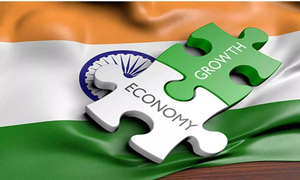America
Recognising India's Strides in Digital Public Infrastructure, Ajay Banga

April 20 :
World Bank group President Ajay Banga praised India's Digital Public Infrastructure (DPI) development as "exemplary" and praised the country's initiatives to distribute social benefits and improve government department and educational efficiency through the use of the system.
According to Banga, who spoke to News India Times while attending the 2024 Spring Meetings of the International Monetary Fund (IMF) and the World Bank Group in Washington DC, "A lot of India's work is currently being taken by the World Bank.". We are attempting to promote digital public infrastructure in other developing market economies, citing the positive work that India and a few other nations have done in this area. We are building a new digital vertical using our knowledge library, as you are aware. Making use of lessons learned in places like India is one of the motivations behind its creation.
Attendees of the week-long spring conference also praised India's efforts in DPI, methane emission reduction, energy transformation, and access to power, as well as its assistance for climate finance issues. "Among the large economies, India is one of the fastest growing nations," Dr. Mohamed Shafeeq, Minister of Finance of the Republic of Maldives, told News India Times. It is admirable that the Indian government has made progress in the economy by digitising economic infrastructure and constructing infrastructure services. With deep historical roots, India is regarded as a crucial development partner in the Maldives.
"India is one country which has registered very strong growth of 6.8 per cent for FY 24-25," said Krishna Srinivasan, director of the Asia and Pacific department at the International Monetary Fund. Srinivasan was speaking during a workshop on the region's economic outlook. In spite of facing a number of challenges recently, India's economy has rebounded to become one of the world's most dynamic and rapidly expanding markets.
The addition of fifteen million individuals to the labour force annually is something else he mentioned. The Indian government must pour substantial resources into healthcare and education if the country is to reap the benefits of its growing labour force.
During a press conference, Banga stated that the world is confronted with a series of interconnected problems...We are collaborating with partners to expand high-integrity carbon markets and forestry, but there are other pressing issues like food shortages, pandemics, fragility, and the need to speed up the availability of clean air, water, and energy. People in the poor world will profit from that, in our opinion.
The World Bank is "continuing to develop a new approach to track climate outcomes based on impact," as Banga pointed out. However, he also cautioned that it is clear that governments, multilateral institutions, and philanthropies are still having a hard time raising the trillions of dollars annually required to combat climate change, disasters, and inequality.
"India provided leadership in the G20 [2023 New Delhi Summit], thereby setting the agenda for all the sustainable finance and climate related issues," said Prasad Ananthakrishnan, an advisor at the International Monetary Fund's Climate Finance Policy Unit, as reported by News India Times. Thus, Brazil is embracing a number of those agenda points. Accordingly, this continuum is crucial in this regard.
India is a key member of the G24, and its chair, Ralph Recto, told News India Times, "India is a very important country, and it can definitely contribute with regard to the problems of the G24" while praising the country's progress in DPI. "I think electricity is a human right" and that people may obtain access to education through power, Banga remarked while discussing the World Bank's plans to enable 600 million people in Africa access to electricity.
Growing up in India, I witnessed firsthand how our nation transformed as more and more people gained access to power. Even as a kid, I witnessed it. "I know this from personal experience," Banga continued, relating anecdotes about his childhood in India and his interactions with electricity. The only thing I can say is that this is a fundamental human right that paves the way for the creation of African employment and capacities.
Banga unveiled a plethora of new initiatives to render the Bank "more agile, faster, and easier to navigate" during the spring meetings. He went on to say that the Bank has been focusing on things like simplicity and speed as part of its "vision and mission" to meet the world's expanding demands.
To combat the negative impacts of methane emissions in fifteen nations, the World Bank has also begun a bold strategy. During COP28, Banga laid out a plan to speed up action on methane and announced that the Bank will spearhead initiatives to bend the curve.
Rahul Kitchlu, manager of the operationalization unit of the climate change group at the world bank, stated at the event "Bending the Methane Curve" that 52% of the methane emissions and 10% of the greenhouse gas emissions came from cattle in India. But with the help of more than three million smallholder dairy farmers in various provinces, the Bank was able to make headway in the areas of animal feed, nutrition, and training and capacity building. In terms of the program's pledge to reduce methane emissions, that definitely went above and beyond. "We noticed a reduction of about 14%, even though our target was about 10%," Kitchlu noted. In a discussion about successful energy projects, Lucy Heintz, a partner and head of energy infrastructure at ACTIS, stated that India has lofty goals regarding the energy transition, aiming to achieve 500 gigawatts by 2030.
When it comes to this, the government is dead serious. It has put money into creating a favourable setting, which is that well-defined structure. Investment in transmission is supported by a great relationship between the corporate and public sectors. Furthermore, Heintz mentioned that the programme has maintained its programmatic approach to determining the route to market for power projects for quite some time.



































